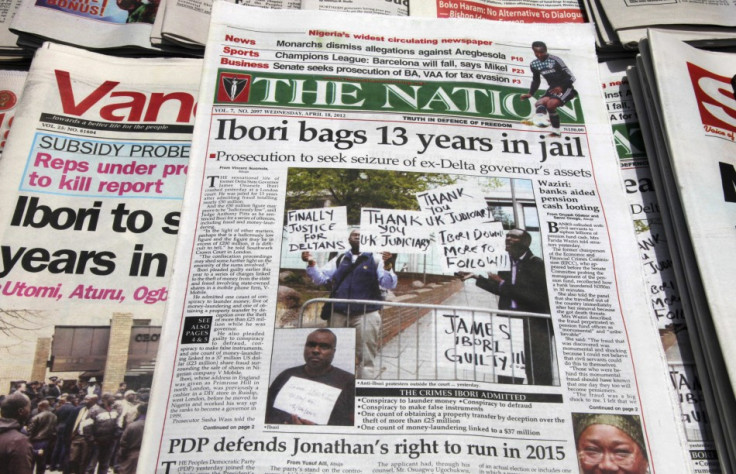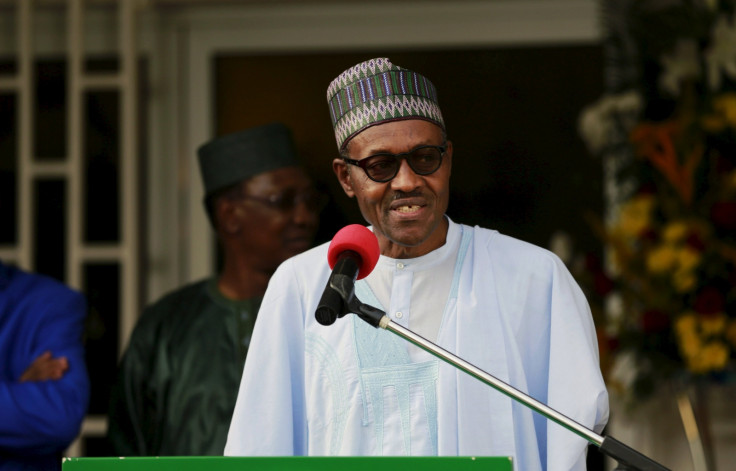Nigeria: Stolen funds repatriated from UK embezzled again as 'vicious circle not broken yet'

Identified funds stolen from Nigeria and reinvested into the UK are repatriated to the African nation with the risk of being embezzled again, making corruption a vicious circle difficult to break, according to Ben Oguntala, director of Security in Africa.
Oguntala made the comment after meeting in London with President Muhammadu Buhari, who asked for the help of Nigerians in diaspora to tackle the country's widespread corruption. After taking office in May, Buhari launched an investigation to recover $150bn (£96bn), which he alleged was stolen during previous administrations. The investigation aims to identify banks and countries where the alleged stolen funds have been lodged.
In order to help Buhari, Oguntala and a team comprising members of Security in Africa and Potent Communications have suggested they create a privately funded Corruption Amnesty Commission chaired by Courtenay Griffiths, QC to identify stolen assets and return them to Nigeria and other countries across Africa, Asia and South Africa, making sure they will be used to benefit citizens.
"Officials in the UK are aware of the fact that the fraudulent activities are here, but what they don't have is the link or the legal link between Nigeria's fraudulent activities and assets," Oguntala told IBTimes UK. "Because obviously, when people take the money from Nigeria, they move it abroad.
We are working with the Nigerian government to support progress against corruption and stand ready to help further
"Stolen money is just being recycled. The perpetrator takes the money and invests [it] in the UK, contributing to the UK economy. [Only a few] perpetrators are successfully prosecuted and the money is returned to Nigeria, but only to the same pot it was stolen from in the first place, with no accountability or governance.
"The commission aims to create a mandate that returns the money to African people and not back to the same pot to be stolen again."
Oguntala's view is shared by Transparency International UK which, in a statement to Oguntala, acknowledged "there is a broader debate about how to ensure transparency [and] accountability of funds returned so that there is confidence that it doesn't just go back into a risk of being embezzled. But no one has really tackled that globally yet".
A Department for International Development (DFID)'s statement sent to IBTimes UK read: "We are working with the Nigerian government to support progress against corruption and stand ready to help further. A major concern is for us to be reassured that the returned funds do not simply end up being recycled out of the country again through fresh corruption.
"The UN Convention against Corruption (UNCAC) does not permit returning states to impose conditions on the use of funds. However, it encourages parties to agree on arrangements. This is our basis for seeking reassurances that returned funds are deployed for productive development purposes."

The UK 'benefits' from corrupted money
Oguntala alleged that only part of the embezzled money is given back to the countries of origin. To support his argument, he cited the case of former governor of Nigeria's Delta state James Ibori, prosecuted in Southwark in 2012. Ibori was sentenced to 13 years in jail after pleading guilty to at least 10 counts of money laundering and fraud. According to Oguntala, the money Ibori had moved from Nigeria to the UK - £50m ($77m) - was not entirely given back to the Nigerian government.
"This created a double theft of the money from Nigeria. The UK government had no legitimate claim to the money but held on to it," he said and alleged the UK's reaction to corruption is only "superficial [because] corruption money from Africa benefits the UK economy".
According to Lee Bennett, CEO and founder of Potent Communications, the UK reacts slowly in prosecuting suspected criminals and recover and repatriate stolen assets. He told IBTimes UK: "There are various factors that contribute to this, including lack of funding and proper support for our law enforcement agencies. However, there also appears to be a lack of genuine resolve to expose and tackle corruption because to do so might create a gaping black hole in the UK economy with all the consequent political and financial fallout."
Buhari is the only African president to put his reputation on the line and say: 'I am going to address this head on, regardless of what it costs me.' And that's the change that Africa needs
Bennett also believes a symposium that was to be hosted by Stephen Phillips QC MP to discuss corruption in Africa, repatriation of stolen funds and the role of the UK government, scheduled for October, was "abruptly" cancelled because it was believed "we didn't intend to pull any punches when it came to exposing corruption, as unpleasant as that may be for some".
He added: "But this re-affirms how our mission is more important than ever. Dealing honestly with the problem of corruption as we do, means making a thorough and open assessment of what is actually happening and necessarily means exposing the weaknesses in the current system and the unhealthy self-interest of various parties."
Both Phillips and his assistant Emma Salisbury declined to comment for this article.
'UK bound by international laws'
DFID and the UK National Crime Agency (NCA) strongly denied the UK benefits from corrupted money or that it helps corruption in any form in Nigeria or elsewhere.
NCA clarified that the UK is bound by international laws to repatriate stolen funds. A spokesperson told IBTimes UK: "The claims are fundamentally wrong. The International Corruption Unit has through the Home Office ensured that assets seized, confiscated or forfeited that fall within Article 57 of the United Nations Convention Against Corruption 2005 are returned to the country from where they were stolen from.
"Ibori is still awaiting confiscation proceedings in the UK. We have already repatriated some money and we are in the process of repatriating another sum," the spokesperson continued. "The reason why we are investing more into fighting international corruption is because it [corrupted money] doesn't benefit the UK. The corruption unit has been set up to increase our ability to repatriate money."
DFID said: "Return of assets is still an emerging practice. There are no firm precedents to follow. The UK will therefore be setting standards for others."
Both Bennett and Oguntala believe the commission is the best solution for Buhari and is also a deterrent for those who want to steal assets.
"Part of the amnesty is to name people. If people who receive funds can start naming those who gave them the money, we can finally start addressing the source of corruption in Africa," Oguntala said. "Buhari is the only African president to put his reputation on the line and say 'I am going to address this head on, regardless of what it costs me'. And that's the change that Africa needs."
© Copyright IBTimes 2024. All rights reserved.







